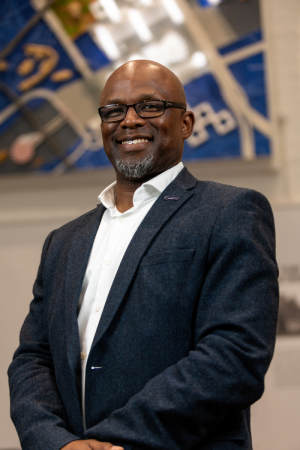Bola Abisogun OBE FRICS is held in high acclaim within the built environment community for his work around diversity, inclusion and change.
 Awarded an OBE in 2019 for his services to diversity and to young people in the construction industry, Bola is a friend of the show and a previous speaker. He has a string of accolades and achievements under his belt, the most recent being his appointment as Digital Director for BIM Academy.
Awarded an OBE in 2019 for his services to diversity and to young people in the construction industry, Bola is a friend of the show and a previous speaker. He has a string of accolades and achievements under his belt, the most recent being his appointment as Digital Director for BIM Academy.
As well as being the Executive Director at DiverseCity Surveyors, Bola is also an eminent Independent Management Consultant, Chartered Construction Manager, Chartered Surveyor and Fellow of the Royal Institution of Chartered Surveyors (RICS).
In this thought leadership piece, Bola conflates two distinct issues he holds close to his heart that have engulfed and shaped his career.
Admittedly I’ve been frustrated for almost three decades. You see, in 1994 I emerged from university having completed my thesis which, apparently, was so forward thinking, that I had to be called back to verify the contents as being that of my own work.
On reflection, I have also questioned whether that was my introduction to prejudice and bias? However, the fact the adjudicating panel awarded me a double first for ‘genius type material’ meant that is actually wasn’t that bad as an outcome, and in fact, only served to inspire and shape my career for the next 30 years.
So, during the Summer of 1994, I boldly returned to London having spent three of the most amazing years in Wolverhampton, studying to be a Quantity Surveyor and emerged onto the PQS scene equipped with a first-class honours and a genius idea that even at time, adopted BIM processed workflows, that deployed neural networks [Artificial Intelligence] and hyperlinked relational expert systems [Machine Learning]. So how is that in 1994, having joined a major / top 10 firm of Project Managers and Quantity Surveyors, I was assigned to a major commercial office project and mandated to count ironmongery for three of my first six months. I genuinely thought that I was in the wrong sector, but little did I know, the sector had its own challenges way before I was even born.
As for being different and suffering the age-old challenge of discrimination, I realised very quickly that, as a young Black man, being good was simply not enough. No, I had to ‘create value’ everywhere I went and that meant thinking outside the box, with tech as my USP, even though most of my conversation fell on deaf ears.
During my APC some four years later, I introduced the concept of BIM into my critical analysis and literally had a heated debate with the Chairman of my panel, but in the end, I conceded in a bid to be given a pass; and I still failed. I was enraged and thought next time around I’m sticking to my guns; I qualified a year later in 1999 and left the corporate side of the profession, going freelance in late 2000 upon my return from Atlanta in the USA.
In 2003, I registered my pet project AIQS Limited at Companies House [on 17th February 2003]; and as an example of how far ahead of the curve I was even at that time [and remain today] the business case for AIQS was literally unlocked by the January 2020 pandemic and legitimised by the March 2020 first lock-down as the world entered into the current paradigm shift, of working from home.
Fast forward to March 2022 and, having worked with some of the best minds across the sector to develop the CDBB Digital Twin Toolkit, I have successfully completed a 32-month sabbatical away from traditional construction with a focus on the emerging digital construction [leading towards digital twins] inspired by the dire revelations associated with the Grenfell Tower tragedy.
The challenge I put to the sector is a comprehensive one and conflates two key issues present across the sector… the digital skills gap and low levels of digital maturity across the sector, exacerbated by a lack of R&D into new ideas and processes, combined with the over-arching and well documented lack of diversity; are a consequence of prejudice, bias and a general lack of understanding.
As a vehicle to effectively deliver a holistic solution, the Digital Twin Skills Academy (we launched successfully on 03.11.22 in the London Borough of Barnet); is a part of the solution to help level the playing field and create more accessible career opportunities for young people and career changers. At the core of our why, is the idea around merging digital skills, with demonstrable intergenerational working practices in seeking to foster more meaningful relationships across different stakeholders, groups of people and of course diversify the sector by default.
To succeed in the digital [and specifically the digital twin] space collaboration is key and STEM subjects become more relevant and given that these areas of academic prowess tend to be dominated by the non-traditional talent pool, I am both optimistic and assured that industry diversification will occur in greater numbers than ever before. At least, that’s my optimistic view.
The challenge therefore is not to accept that technology has a role to play in the overall progression of our circa $10trillion sector, but rather that cultural behaviours will need to change and more importantly stay abreast of the cycle of change management that is at play. A holistic paradigm shift has already taken the industry by storm; the ambition must be to create better outcomes for society by engaging every willing participant in the process.
 By Grace Donnelly
By Grace Donnelly